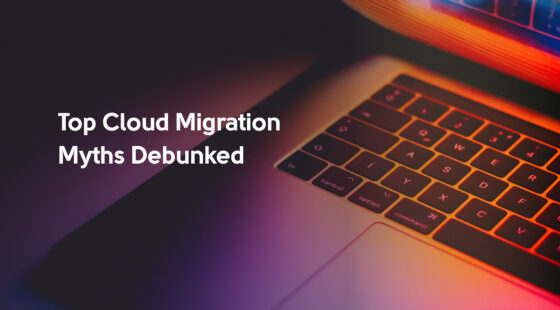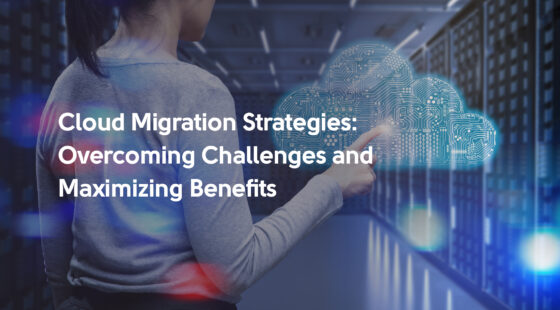As companies allocate nearly 29% of their IT budgets to cloud services, challenges like misconfigurations, human errors, and wasted spending – currently as high as 32% – persist.
Selecting the right development services provider is crucial to maximizing investment and ensuring robust, scalable, and secure cloud solutions. Asking the right questions helps evaluate their technical knowledge, cost management practices, and capacity to align with your future objectives.
Let’s explore the top 10 questions to ask your cloud development services provider to make an informed decision. We've compiled this list with insights from our cloud experts. So, you can be sure in its relevance.
Question #1. What is your experience in a specific domain?
Understanding a provider’s experience in your business domain is crucial for finding the right fit. Verify their history of successful collaborations within comparable business segments. Request specific examples and detailed case studies that showcase their competency in solving sector-specific issues. For example, if you operate in healthcare, assess their familiarity with HIPAA regulations, their capability to implement protected medical information systems or their experience in creating remote healthcare solutions.
Additionally, examine their processes for comprehending and responding to your specific requirements. How do they conduct initial assessment phases to spot operational challenges and workflow inefficiencies? How do they customize their offerings to match your sector's strategic needs? Service providers with domain-specific knowledge can foresee challenges, propose creative solutions, and adapt their strategies with your company objectives. By confirming their capacity to produce tangible outcomes in your industry, you can establish an effective collaboration that enables growth.
Question #2. Which cloud platforms do you work with?
Major cloud providers like AWS, Azure, and Google Cloud offer unique features and serve various business needs. This question reveals the provider's knowledge of these platforms and their ability to address your particular needs for regulatory compliance, growth potential, and system connectivity. As a customer you could be interested in further development of your cloud infrastructure while keeping existing applications healthy. In this case, you need to assess services provider’s expertise with platform-specific technologies and features, like AWS Lambda, Amazon DynamoDB or Amazon API Gateway is you have serverless applicaitons or for container management using GCP services as Google Kubernetes Engine or Cloud Run.applications or for container management using GCP’s services such as Google Kubernetes Engine or Cloud Run. In another case, you could be interested in migrating to another cloud provider if you are not satisfied with current solutions.th current solutions. For that you need to assess their capability in handling sophisticated multi-cloud deployments or hybrid configurations that merge local infrastructure with cloud-based solutions.
In short, you should search for a collaborator who can deliver smooth transitions, reduce service interruptions, and maximize cost efficiency.
Question #3. Do you have experience in hybrid environments?
Hybrid setups can vary significantly, encompassing combinations like on-premises data centers with public cloud extensions, private cloud infrastructure paired with public cloud services, or multi-cloud strategies integrating multiple public cloud providers. Experienced providers can manage workloads effectively across diverse environments, ensuring seamless integration, stable operations, and optimized performance. Find more details on hybrid environments in our recent article.
Ask how the provider handles system interoperability, ensuring that applications and data flow smoothly across on-premises and cloud platforms. Inquire about their experience with hybrid cloud gateways, cloud management platforms, and data synchronization tools. Their ability to manage workload distribution, implement consistent security protocols, and address latency or connectivity challenges is critical for achieving a cohesive hybrid infrastructure.
Furthermore, a capable provider should offer insights into designing hybrid environments tailored to your business needs, whether you require enhanced disaster recovery, compliance with data residency laws, or improved scalability for specific workloads.
Question #4. What are your approaches to cloud migration?
If you are planning to migrate workflows to the cloud, you already know that moving to the cloud requires a well-planned approach beyond data transfer alone. A competent service provider must present a detailed methodology encompassing requirement gathering, current system evaluation, and clear migration phases. The initial focus should be on understanding your organization's objectives and determining critical software, equipment, and processes that need prioritization during the shift.
The provider's strategy should incorporate an in-depth review of your existing technology landscape, identifying system interconnections, possible challenges, and areas for improvement. They need to establish a definite schedule and method for implementing the transition while ensuring minimal business interference. Critical phases typically include developing an initial test case, executing gradual transfers, and confirming success at each milestone before advancing.
It's crucial to explore the provider's solutions for managing complications like data security, speed concerns, or system integration issues. Their plan should address post-transfer verification and refinement to confirm the cloud environment delivers the expected results. Selecting a provider with a methodical and organized migration approach helps ensure a seamless transition that enhances productivity and reduces service interruptions.
Question #5. What security measures do you implement in cloud development?
Security is non-negotiable. A reliable provider should outline their approach to safeguarding your data and applications. Inquire about their data protection methods, specifically implementing encryption for stored and transmitted data, to verify information security. Request details about their security monitoring approach, specifically focusing on the use of security governance services, automatic scanning tools, deployment of breach prevention tools, and the schedule of security assessments.
Furthermore, review their adherence to key industry requirements and frameworks, based on your organization's requirements. This confirms their capability to manage confidential information within legal boundaries. It's crucial to understand their security breach protocols – what are their timeframes for identifying, addressing, and resolving potential security issues? Examining their historical success in security maintenance and their dedication to staff security training can reveal their level of commitment to protecting your cloud infrastructure.
Question #6. What is your data backup strategy? How do you implement disaster recovery scenarios?
A comprehensive data backup and disaster recovery plan ensures operational continuity and protects valuable data assets. Begin by investigating the provider's backup methodology, including their backup frequency, storage locations, and implementation of redundant systems to defend against equipment failures or security breaches. Verify that the provider implements secure storage solutions across multiple geographic locations to reduce vulnerability to localized failures.
Regarding disaster recovery (DR), examine their specified recovery time objectives (RTO) and recovery point objectives (RPO). These key indicators reveal the expected system restoration speed and potential data loss during service interruptions. For optimal preparedness, the provider must present a comprehensive DR strategy encompassing risk evaluation, failover procedures, and systematic testing protocols.
Investigate their deployment of automated monitoring systems for issue detection and recovery initiation, along with their protocols for managing major disruptions such as environmental disasters or security incidents. Their capability to seamlessly integrate DR solutions with your current systems and provide detailed recovery procedures will showcase their competence in reducing operational disruptions and maintaining service stability. By confirming their implementation of a thorough and clearly documented data backup and disaster recovery framework, you can trust their ability to safeguard your mission-critical data and operational systems.
Question #7. What support and maintenance services do you offer post-deployment?
Cloud solutions require ongoing support to adapt to evolving needs and maintain optimal performance. A reliable provider should offer a comprehensive suite of support and maintenance services designed to address various aspects of your cloud infrastructure. These services may include:
- Proactive monitoring and issue resolution. The service provider should persistently watch your cloud setup for potential challenges, including performance limitations, security risks, or excessive resource usage. Active monitoring enables quick identification and handling of issues before they affect your business activities.
- Regular updates and patching. Software updates and security patches are crucial for maintaining system protection and modernization. Ask about the timing and extent of these maintenance activities and if the provider employs automated systems to enhance efficiency and reduce interruptions.
- Performance optimization. Over time, your cloud environment may require adjustments to maintain optimal performance. This could involve refining resource allocation, optimizing application configurations, or leveraging advanced tools to improve speed and reliability.
- Scalability support. Your cloud infrastructure should expand with your business development. A reliable provider will help manage resource scaling according to your operational needs and assist with expansion planning.
- Technical support. Ensure the provider offers a responsive help desk for technical assistance. Understand their availability hours, typical response duration, and whether they supply dedicated support representatives or technical specialists.
- Disaster recovery and backup management. The provider must implement comprehensive backup and recovery protocols. This encompasses scheduled backups, distributed storage across locations, and swift restoration capabilities to reduce operational disruptions during emergencies.
- Custom reporting and analytics. Regular efficiency and utilization assessments help understand your cloud environment better. These insights enable strategic planning, expense management, and identification of enhancement opportunities.
- Training and knowledge transfer. To empower your team, some providers offer training sessions and resources to help your staff effectively manage and maintain the cloud environment.
Question #8. What certifications does your company have?
Professional certifications demonstrate a provider's technical competence and adherence to industry benchmarks. Search for credentials specific to cloud services, data protection, and regulatory requirements, like AWS Advanced Tier Services Partner, ISO 27001, or SOC 2. These certifications demonstrate the provider’s dedication to maintaining best practices and adhering to global standards.
Svitla Systems proudly holds several key certifications:
- ISO 9001:2015 Certified Provider. This certification acknowledges Svitla Systems’ excellence in managing and delivering full lifecycle software development. Our processes meet the highest quality standards from design and development to testing, deployment, and support.
- SOC 2 Certified Provider. This certification ensures that Svitla Systems meets the highest data security and privacy standards. We follow the five trust principles: Security, Availability, Processing Integrity, Confidentiality, and Privacy.
- AWS Advanced Tier Services Partner. As an AWS Advanced Tier Services Partner, Svitla Systems addresses complex challenges, from seamless migrations to advanced application development on AWS. This status highlights our expertise and capacity to deliver tailored, innovative AWS solutions.
Question #9. How do you ensure consistency across development and operations?
Alignment between development and operations teams is essential for maintaining smooth and productive workflows in cloud-based environments. Leading cloud platforms, such as AWS, Microsoft Azure, and Google Cloud, advocate architectural guidelines like the AWS Well-Architected Framework to establish operational standards. These principles emphasize operational efficiency, security protocols, system dependability, performance enhancement, and resource optimization.
Ask your provider about their implementation of these frameworks to verify synchronization between development and operations teams. Their strategy should incorporate standardized CI/CD methodologies and tools. This guarantees consistent and repeatable code development, testing, and deployment processes. Automation is crucial in this context, from automated testing and deployment pipelines to infrastructure setup using IaC platforms such as Terraform or AWS CloudFormation.
The provider should also foster a DevOps culture where development and operations teams work together to share responsibility for application performance and reliability. This includes implementing observability tools that offer real-time insights into system performance, such as metrics, logs, and traces.
Question #10. Do you provide FinOps services?
FinOps, short for financial operations, is an operational framework and cultural practice that maximizes the business value of the cloud. A FinOps service provider can optimize your cloud investments and connect spending to organizational objectives.
Some key FinOps services include:
- Cost optimization. Evaluating resource utilization, suggesting appropriate sizing options, and implementing cost-effective reservation models to cut cloud expenses.
- Budgeting and forecasting. Delivering comprehensive cost breakdowns and future projections to enable strategic budget planning and allocation.
- Real-time monitoring. Implementing tools and dashboards to track cloud usage and spending, so you can make informed decisions easier.
- Governance and policy enforcement. Establishing guidelines to manage expenses, implement boundaries, and avoid cost overruns.
Consulting with your provider about these services helps establish a thorough strategy for cloud cost management. Check out our blog post for more insights into FinOps and cloud governance policies.
Conclusion
In today's fast-paced digital environment, selecting an appropriate cloud development services partner has become increasingly crucial. Through strategic questioning, you can validate that your selected provider matches your organizational objectives and possesses the capability to handle cloud transition challenges, protection measures, and continuous assistance. Every inquiry is essential in evaluating the provider's technical knowledge, dedication to protective measures, and capacity to enhance DevOps collaboration.
As you begin this process, remember that partnering with the right provider can substantially influence your cloud approach and company performance.
If you're prepared to advance your cloud technology optimization, contact us to explore how Svitla’s team can address your specific requirements and propel your business forward in the cloud space. Together, we can create a robust, protected, and productive cloud infrastructure!




